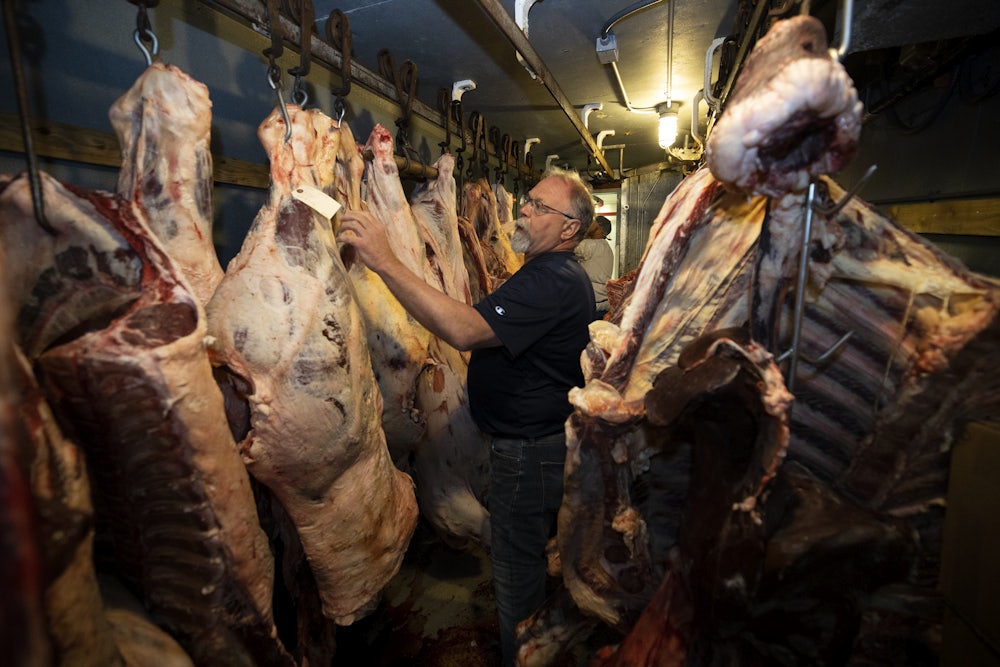“I’m a capitalist,” President Joe Biden said in Tuesday’s State of the Union address, “but capitalism without competition is not capitalism. Capitalism without competition is exploitation. It drives up profits.”
Actually, capitalism without competition is a kind of capitalism. It’s monopoly capitalism, toward which capitalism tends when left unattended, as has been happening now for about four decades. Biden ad-libbed:
I need not tell some of my Republican friends from [Western] states, guess what, you’ve got four basic meatpacking facilities. That’s it. You play with them, or you don’t get to play at all. And you pay a hell of a lot more. A hell of a lot more when there’s only four.
The four meatpackers account for 85 percent of all U.S. cattle that are raised to be eaten (as opposed to cows that are raised to be milked). As recently as 1977 they accounted for only 25 percent. The four firms are:
JBS, a Brazil-based company that entered the U.S. market in 2007 by purchasing Swift & Co., a giant pork and beef processor, and became the biggest meatpacking company in the world. JBS’s U.S. headquarters is located in Colorado. According to a 2019 report by the Open Markets Institute, the Agriculture Department concluded in 2018 that JBS “ripped off U.S. cattle producers at three separate slaughter facilities by shorting them on payments for their cattle and, although the abuses were extensive, settled the claims for only a $50,000 penalty.”
Tyson, based in Arkansas. It’s the world’s second-largest meatpacker and America’s largest poultry company. Tyson has been the target of multiple class-action lawsuits alleging price-fixing. It settled one of these last year for $221.5 million. Tyson was also the company where managers of an Iowa pork plant got caught placing bets on how many workers would get Covid-19.
Cargill Meat Solutions, based in Kansas, is a subsidiary of the giant Minnesota-based grain company. It was created in 1979 when Cargill purchased a conglomerate, MBPXL, which in turn was created by merging Kansas Beef Industries and Missouri Beef Packers. Last summer, The Atlantic ran an article by Michael Holtz about what it was like to work in a Cargill meatpacking plant in Kansas. “I consider myself lucky,” Holtz wrote, “to have ended up in the nurse’s office only once.”
Marfrig, another Brazilian company, owns most of National Beef Packing, the fourth-largest beef packer in the United States, which is based in Kansas City, Missouri. According to a June 2020 Bloomberg story by Polly Mosendz, Peter Waldman, and Lydia Mulvany, Aleja Perez, a 56-year-old immigrant from Cuba who was exposed to Covid in a National Beef Packing plant, asked to be tested and was told, her son reported, to keep working if she had no symptoms. She finished the week’s work, went to the hospital, and died.
The economic concentration of the meat industry is not confined to beef. According to the Open Markets report, since 1986 the market share of the four largest poultry companies has grown from 35 percent to 51 percent, and since 1976 the market share of the four largest pork processors has ballooned from 33 percent to 66 percent.
When you have a monopoly or an oligopoly, there are three things you can do.
The first option is to leave well enough alone and trust that innovative entrepreneurs will overthrow existing monopolies. This approach is associated with the Harvard economist Joseph Schumpeter (1883–1950), and it’s what the U.S. government has mostly done since the Reagan administration. As the statistics on beef and poultry and pork demonstrate, it doesn’t work (which may explain its appeal to Republicans and the more pro-business Democrats). Even when existing monopolies get overthrown (as, for instance, in the early 1980s when Microsoft displaced IBM in the nascent personal computer market), you typically just end up with a new monopoly.
The second option is to try to tame monopolies through strict regulation and government planning. This approach is associated with the corporate liberalism advanced by the economists Adolph Berle (1895–1971), who was one of President Franklin Roosevelt’s more influential brain trusters, and John Kenneth Galbraith (1908–2006), best known as a popular author of the 1950s and 1960s. It was the dominant approach during the 1950s, 1960s, and 1970s, and it inspires nostalgia among people like me who worry about the post-1979 trend toward growing income inequality, which reversed the previous half-century trend of incomes becoming more equal, or at least not becoming less so. The industrial monopolies in question were unionized, and the unions were powerful enough to extract, as part of an informal tripartite arrangement with management and the government, wage gains commensurate with productivity increases. A significant drawback to corporate liberalism was regulatory capture, by which the federal government came to have difficulty distinguishing industry’s interest from the public interest on matters like air and water pollution. Corporate liberalism died with the deindustrialization trend that started in the late 1970s. (It’s probably not a coincidence that income inequality took off at the same time.)
The third option is to break up the monopolies by bringing antitrust lawsuits against them. This approach is associated with Supreme Court Justice Louis Brandeis (1856–1941) and the Progressive era. It was de-emphasized starting in the late 1930s and eviscerated starting with the Reagan administration.
Today, the Schumpeter approach is a fantasy and the Berle-Galbraith approach is very hard to make work because the monopolies in question are typically nonunion (and, in the case of the meat oligopoly, they can bully not only employees but also the ranchers and farmers who supply them with cattle, pigs, and chickens).
That leaves antitrust.
The issue has acquired some urgency from the Covid crisis. In December, National Economic Council director Brian Deese and deputies Sameera Fazili and Bharat Ramamurti presented evidence that three of the big four meatpackers plus Seaboard, another big player based in Kansas, were reaping windfall profits from the Covid pandemic. (Cargill was excluded because it’s privately held and therefore doesn’t have to make its data publicly available.) Since December 2020, prices have risen 14 percent for beef, 12 percent for pork, and nearly 7 percent for poultry, accounting for half the increase seen during that period in food prices. Meanwhile, profits for these companies are up 120 percent since the start of the pandemic. Net income is up 500 percent.
That’s what Biden was talking about in the State of the Union when he said, “You play with them, or you don’t get to play at all.” But exasperatingly, Biden didn’t say what he’s going to do about it.
Biden’s administration supports Democratic legislation to require beef processors to furnish ranchers greater price transparency, and in January Biden allocated $1 billion from last year’s Covid relief bill to expand competition in the meat-processing industry. That’s a good start. But really these behemoths just need to be carved up. It’s obvious that Biden wants to. Possibly it would require legislation that would be hard to pass. But he should at least begin the discussion. As Miles says in Risky Business, the 1983 movie that made Tom Cruise a star, “If you can’t say it, you can’t do it.”










